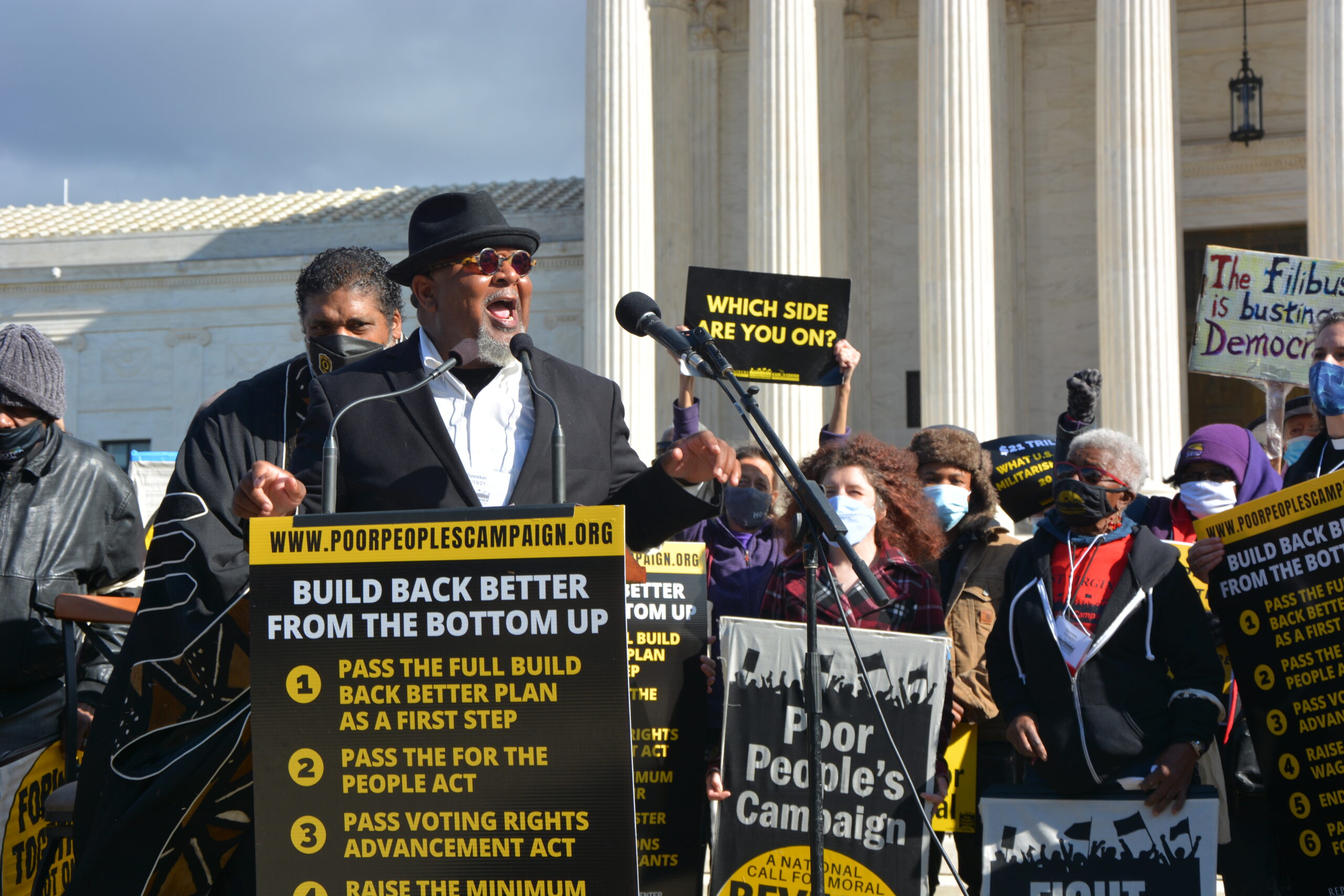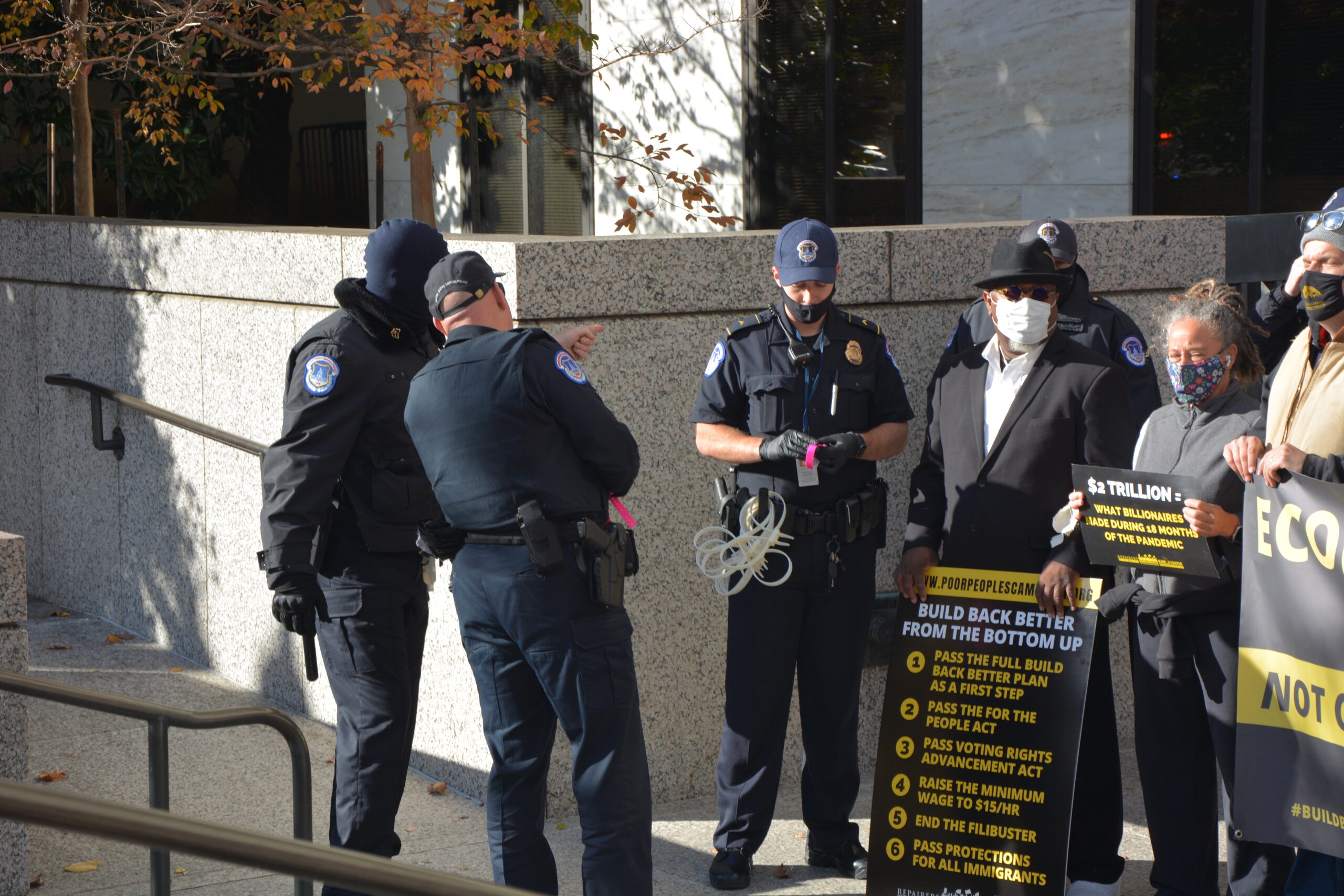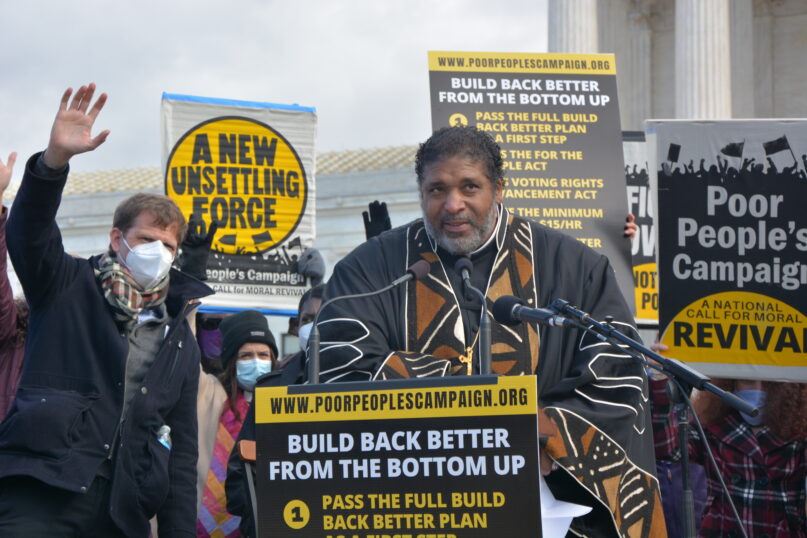WASHINGTON (RNS) — Religious leaders are pushing federal lawmakers in different directions as they debate major aspects of President Joe Biden’s legislative agenda, with some framing support for anti-poverty measures as a matter of faith and others expressing concern the federal government will do away with some religious exemptions.
But regardless of their cause, faith groups across the spectrum are targeting the same Democratic senator: West Virginia’s Joe Manchin.
The faith-led Poor People’s Campaign, which advocates for policies that range from immigration reform to a $15-an-hour federal minimum wage, used a direct approach on Monday (Nov. 15), when the anti-poverty group staged a protest on Capitol Hill. Faith leaders and low-income activists with the campaign accused Manchin and other lawmakers of blocking or watering down social policy elements within a slate of bills — also known as Biden’s “Build Back Better” agenda — currently making their way through Congress.
Their demonstration came the same day Biden signed into law his $1.2 trillion bipartisan infrastructure package, which incorporates aspects of Biden’s Build Back Better plan.
“Why is it that we will … stop with just infrastructure for our bridges and technology and roads, and leave undone the bridges for our society and our personal lives, which are health care, education and wages — or the infrastructure of our democracy, which is voting rights?” said Poor People’s Campaign co-chair the Rev. William Barber II.

The Rev. Paul Dunn, pastor of First Baptist Church in Charleston, West Virginia, addresses supporters with the Poor People’s Campaign outside the Supreme Court on Nov. 15, 2021. RNS photo by Jack Jenkins
Barber’s group staged a series of dramatic protests in Washington and elsewhere over the summer, including a large peaceful demonstration on Capitol Hill that featured civil rights leader the Rev. Jesse Jackson and resulted in hundreds of arrests.
The subjects of their ire were usually Arizona Sen. Kyrsten Sinema and Manchin, a duo that sparked widespread frustration among Democrats for repeatedly stymieing efforts to pass various liberal legislative proposals. Further infuriating liberals is the pair’s opposition to ending the use of the Senate filibuster rule that requires a 60-vote supermajority to pass many major pieces of legislation.
Barber singled Manchin out again on Monday, noting his opposition to expanding Medicare, a proposal now incorporated into a spinoff bill known as the Build Back Better Act.
“You get up in a state that’s 49th in the nation in median income, and you get up in a state that’s 50th — last, dead last — in life expectancy, and then you use your power to block health care … and then you want to claim that you are a person of faith?,” Barber said of Manchin, a Catholic. The North Carolina pastor then shouted the biblical cry of “Woe!”
Also among the speakers was the Rev. Paul Dunn, pastor of First Baptist Church in Charleston, West Virginia. Dunn was featured in an advertisement praising Manchin in September, lauding the lawmaker’s role in crafting the Freedom to Vote Act and concluding “this is the kind of action and leadership our state deserves.”
The voting rights bill, which was blocked by Senate Republicans in October, was derided by many liberals who considered it a watered-down compromise that fell short of addressing voting rights.
But Dunn appeared to have a change of heart about Manchin at the protest, saying he fielded tough questions from parishioners after Manchin expressed fears of an emerging “entitlement mentality” in September.
“I’m just here to remind you, Joe, that constituents of West Virginia — the ostracized, the parenthesized, the marginalized, the kicked to the curb … need you to think about them, Joe, when you are thinking about the Build Back Better plan, voting rights and ending the filibuster,” he said. “That’s the type of leadership that West Virginia needs.”
The pastor then referenced a New Testament passage focused on leadership, saying, “Timothy says that a leader is one who loves what is good — this Build Back Better plan is good. Ending the filibuster is good.”

The Rev. Paul Dunn, pastor of First Baptist Church in Charleston, West Virginia, is arrested at a Poor People’s Campaign protest in Washington on Nov. 15, 2021. RNS photo by Jack Jenkins
Dunn was also among the roughly 15 activists who separated from the larger group and were peacefully arrested while protesting outside the Senate offices. As police led him away, Dunn and others chanted: “Manchin! Manchin! Can you hear us?”
But while Manchin has showcased little interest in appeasing the Poor People’s Campaign and other liberal-leaning faith groups, he reportedly took up the cause of some conservative-leaning religious groups in recent meetings with fellow Democrats.
Groups such as the U.S. Conference of Catholic Bishops and the Orthodox Union have expressed concerns about provisions in the Build Back Better Act — a sweeping, $1.85 trillion social policy bill — that deal with plans for universal prekindergarten and child care.
Religious groups run a substantial portion of child care centers and preschools in the U.S. — a December 2020 poll from the Bipartisan Policy Center found that more than half of working-parent households used one with a faith affiliation — and are generally exempt from federal nondiscrimination laws. But the bill’s current framing would require religious groups to comply with nondiscrimination statutes. For example, the bill could, among other things, withhold federal funds from faith-based organizations that fire employees for being openly gay — something Catholic schools have done repeatedly in recent years.
But religious organizations argue the exemptions are important to their work and identity.
“There have been religious protections written into (the child care program) all of this time that we can still have religious instruction that relate to our Catholic identity,” said Jennifer Daniels, the USCCB’s associate director for public policy. “They’ve changed the way that program is going to be designed.”
Daniels argued that while low-income parents previously were able to use federal vouchers to pay for their child’s education at religious schools, the new law would designate religious schools that receive those funds recipients of direct financial federal assistance — a designation that carries with it nondiscrimination provisions.
“Catholic teaching tells us that parents are their child’s first and primary educator, so they should have a say in where their child gets to go to school and what type of school that is,” said Daniels. “If they choose a religious school for their child, they should have the ability to do that.”
According to The New York Times, Manchin took up the cause in a recent closed-door meeting with Senate Democrats, urging fellow lawmakers to make religious groups eligible for any available funds — including, presumably, the $400 billion the bill currently sets aside for universal prekindergarten and child care programs.
The proposal reportedly was welcomed by lawmakers in the room with widespread approval.





